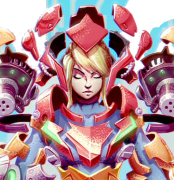|
I haven't played a ton but I've never run into someone just generating a random obstacle for them to try and overcome. That's weird. I'm not sure what I'd do as a DM, I wouldn't want to make the player feel bad by questioning that in the moment but I'd probably talk to them afterward about when it's appropriate to try and introduce new scenarios. I'm fine with, "Is there any rope in the room? I take it and make a lasso!", something that the player requests to try and improvise a solution to a problem the DM introduced, I completely do not understand why a player would say, "Is there a log!? I move the log!" and then the log isn't, y'know, actually for anything. Why introduce a problem if it's not building toward a solution the player wants to try? It also depends on how frequent it is, if it's small things every once in a while and it doesn't affect the flow of the game much I'd probably let it slide. If it was major and started affecting pacing I would definitely bring it up.
|
|
|
|

|
| # ? May 31, 2024 15:14 |
|
Trivia posted:
I share your preferences for how skill challenges should work, but I also think that you're overthinking it. I would suspect that the DM was just trying to get people engaged, and therefore was encouraging any application of skill mechanics. While D&D typically highlights creative-problem solving, there is room for group narrative-building in certain circumstances. Generally when I'm DMing I try to avoid having players do both at the same time though: I might ask them how they want to solve a problem (How are you going to track a magical stag?), or conversely I might ask them to contribute a narrative element (You come to a clearing with an obstacle, what do you find there?)
|
|
|
|
I think the DM was just happy to have the player engaged in some way, even if it was tackling their own conjurer obstacles. I think he's probably hoping it will lead to more roleplaying outside of puzzle/combat/challenges. Like "my character goes and crushes a rock because he's so angry!" Is basically the same thing but with different context.
|
|
|
|
Trivia posted:I just had a session where our DM tried a simple skill challenge and I personally felt it flopped. As often described, a skill challenge let's players come up with novel or inventive ways to use their proficient skills (or otherwise less used skills) to score X successes before Y failures in order to complete the challenge. Players are encourage to be creative and justify their use of a skill. You're overthinking it. It's all made-up, every last bit of it. "Tell me about an obstacle you found on the way, and how you tried to overcome it". There "was no log" before that player said there was but it was ok, they were gonna try to move it. The party wasn't lost until you said they were but it was ok, you were gonna try to figure out where East was.
|
|
|
|
Elector_Nerdlingen posted:You're overthinking it. Yep. Best to be up front about it, but I love this approach, mixed with presenting some planned/semi-randomized challenges. My last session we covered some downtime the players did, and most of them did stuff that let them get contacts in the city they're in. I just told them "okay, tell me about who you made friends with". I wrote those down and now I have a name, race, occupation, and a couple starter details for 1-2 NPCs per player - all I have to do is fill in the gaps and figure out a way to make them relevant to the story at some point (which is way easier than coming up with characters from scratch, at least for me).
|
|
|
|
Trivia posted:I just had a session where our DM tried a simple skill challenge and I personally felt it flopped. As often described, a skill challenge let's players come up with novel or inventive ways to use their proficient skills (or otherwise less used skills) to score X successes before Y failures in order to complete the challenge. Players are encourage to be creative and justify their use of a skill. If I'd been the GM in that situation the only thing I would have done differently is maybe encouraged the player to embellish a bit, to maybe tie it into the result of your roll somehow or give the next player something to build off. I'd also have asked you to embellish what you were doing a bit. You: "I use perception to locate the sun, to try to determine East" Me: "You find the sun fairly easily, but do you notice anything else?" You: "Nope" Me: "OK anyone else?" Her: "I use my athletics to move a log that's blocking the path." Me: "Is it a big log? Why is it there? Is it the only thing blocking the path or is it the easiest piece to move from a larger blockage?" Her: "It's most of a tree, it blew down in a storm." Me: "Sounds good. who's next?" Him: "A river we need to ford is swollen from the same storm. I rig up something to help us get the cart across safely" Me: "OK let's have a look at those tool proficiencies"
|
|
|
|
Trivia posted:I just had a session where our DM tried a simple skill challenge and I personally felt it flopped. As often described, a skill challenge let's players come up with novel or inventive ways to use their proficient skills (or otherwise less used skills) to score X successes before Y failures in order to complete the challenge. Players are encourage to be creative and justify their use of a skill. Trying to make a long journey interesting without at once making it seem way too fast is a nightmare in any game system, but I don't really think it's what skill challenges would be intended for - maybe if surviving on the journey was an issue, but not just going from one point to another. quote:I am familiar with it so I started with my skill and justified it. Something like "I use perception to locate the sun, to try to determine East" (which is where we needed to go). This is why not - having to roll Perception to see the sun is obviously silly (what would it mean if you had failed?) but the "skill challenge" rule forces you to roll for anything that matters. quote:Another player said "I use my athletics to move a log that's blocking the path." The DM said ok and we rolled with it, but to me that was no bueno. This is really a totally different issue. The problem with long journeys in interesting (but not dangerous) terrain is that the GM can't possibly have recorded every log (or anything else) that might have fallen in several miles of terrain, nor can they describe every vista you might see on the way even if they would be spectacular; so their option is just to make up a certain number of tasks at random then rule the journey is complete. Again the insistence on using a skill challenge was warping things here (why not just walk around the log? because it wouldn't be a roll) Whether or not the GM involves the players in suggesting what's encountered on the way is variable and while some people are really uncomfortable with it for the reason you describe, it doesn't make that much difference to the overall play of the game.
|
|
|
|
Elector_Nerdlingen posted:You're overthinking it. ^ This. The goal of a skill challenge is to find plausible ways to use skills to solve potential problems as you take on an ambiguous task. It's not about going from points A to B, it's about going from A to E and collaboratively deciding what's at B, C, and D. Saying that you had to roll perception to spot the sun implies that your first problem at point B could be solved through wayfinding without the DM explicitly saying it. The other player did the same thing when they said that they wanted to remove physical obstacles that got in the group's way.
|
|
|
|
Splicer posted:Me: "OK anyone else?" Like the DM should be saying there's a log, or a blockade in the way, or a surface is too steep or whatever, and then the players can roll athletics to climb over, then work out how to get their friends up as well, or open it from the other side, or look for a rope. But if they're asking the players to come up with their pwn problems as well as solutions? There may as well be no DM in that equation. The players should only ever be coming up with solutions, not the problems themselves. I think specifically it's the idea of the player saying "There's a log" rather than "Why are we held up? Is there a log in the way?" Even then ot doesn't make sense, I think I need more context around the skill check and how it was phrased by the DM. Did he say "Ok, you have to get to the next town, do some skill checks, I'm going to get a coke zero' or something?
|
|
|
|
Bobby Deluxe posted:The main thing that feels weird about this example (and the OP's experience) is that the players should be reacting to things in the world, not creating them. I can't quite put it into words, but it just feels funamentally wrong. If it helps, you can think about it as crowdsourcing the a-good-GM-would stuff. A good GM would include obstacles that gave every character a chance to shine. Instead of that, just ask each character how they shone. Same result, less work, no chance of messing it up or missing someone or anything.
|
|
|
|
Hmm. It still doesn't sit right with me, and I could probably find a chunk of the DM's guide about their role as storyteller, but ehh. The great thing about D&D 5e is it's flexibility with different playstyles, and if the rest of the group was ok with it, probably best to just bite your lip and think of some cool stuff your character could do.
|
|
|
|
The problem with "players should only ever be passive and not create things" is that... it kinda defeats the point of playing the game at all. Just by being there, a player is constantly creating things or saying what happens and why. Even during character generation, let's discount the obvious "this character exists", they're still creating society, culture, history. Why is all that ok but "there is a log" is inherently a problem to be stamped down?
|
|
|
|
Bobby Deluxe posted:The main thing that feels weird about this example (and the OP's experience) is that the players should be reacting to things in the world, not creating them. I can't quite put it into words, but it just feels funamentally wrong. I think DnD encourages the DM to be the end-all arbiter of everything that happens in the world, but I think collaborative storytelling where the players also get to have a direct say is a totally fine way to play as well. There are other systems that do it better, obviously.
|
|
|
|
If it helps, in many other games that aren't D&D, and increasingly in modern games, the players are collaborators in creating not only the story of what their character is and does, but also the setting, up to and sometimes including elements of the plot, NPCs and enemies, and sometimes even their own demise. Game mechanics often support or even demand this kind of collaboration. If it "feels wrong" in D&D to offload some of the creative creation of setting, encounters, etc., that's only because of longstanding habits and tropes common to how D&D has been played; not because this is a wrong or bad way to do roleplaying games generally. People have different feelings and preferences for this, and it's fine if your personal preference is that the GM provide 100% of the setting's details, which you as a player get to discover and experience. It is also fine for other players and/or the GM want to include players in creating or fleshing out details. The important thing is for you and your group to have a conversation about it and if preferences aren't aligned, maybe you can reach some kind of compromise. For my own part, I haven't played D&D since 4th edition, but I've been getting players to creatively add to what I as a GM had in my notes since at least the late 1980s, so even if the "normal" way to play D&D was for the GM (or the module/campaign book the GM is using) to carry all of that load, it was never "the only way anyone did it."
|
|
|
|
Trivia while GM does have final say, you can ask him if it's something that can be raised to the group. Seems like it detracted a bit from your enjoyment... the other player maybe enjoyed it more but it's possible that they feel the same way or have no feelings on it at all.
|
|
|
|
If I were in a group of newish people and someone offered that, I would probably respond by asking "What log? Do you mean you'll use your athletics to clear any obstacles in the way? That sounds great" or something like that. Nudge their actions towards ideas that fit within the narrative without even really addressing the fact they tried to invent an obstacle. I've done this in character occasionally and I think it works pretty well. On the opposite end of the spectrum, I'm joining my coworkers D&D group again tomorrow, but only 5 people including the DMPC this time. Different characters, so another chance to roll up something ridiculous, and I'm a masochist  . Teaching them how to use Roll20 multiplayer tomorrow at lunch at least. . Teaching them how to use Roll20 multiplayer tomorrow at lunch at least.
|
|
|
|
TheAardvark posted:If I were in a group of newish people and someone offered that, I would probably respond by asking "What log? Do you mean you'll use your athletics to clear any obstacles in the way? That sounds great" or something like that. Nudge their actions towards ideas that fit within the narrative without even really addressing the fact they tried to invent an obstacle. I've done this in character occasionally and I think it works pretty well.
|
|
|
|
Splicer posted:This is honestly the most depressing thing I've read all day. And another thread is talking about Threads. I'm assuming we're talking about really new people here  I guess my made up quote comes off a lot more strong army than I meant it to. I just try and collaborate with them, within RP terms, to get them used to the normal D&D way of skill checks. I don't literally put words in their mouth AARD VARKMAN fucked around with this message at 23:49 on Jan 14, 2021 |
|
|
|
TheAardvark posted:I'm assuming we're talking about really new people here 
|
|
|
|
Splicer posted:You're actively discouraging new players from being imaginative and contributing to the scene. I'm genuinely sad that you've done that to them. This is not hyperbole, I am making this actual face
|
|
|
|
Splicer posted:You're actively discouraging new players from being imaginative and contributing to the scene. I'm genuinely sad that you've done that to them. This is not hyperbole, I am making this actual face I guess that's just my understanding of DM-led games - it's weird to start creating obstacles in "their" world since they're taking the time and role of creating it. I can totally see where you're coming from, I may need some exposure to the kind of D&D game that'd allow for more creativity. For what it's worth, I mostly play DM-less collaborative games like Fiasco, so it's not something I'm against on a conceptual level or anything.
|
|
|
|
Bobby Deluxe posted:There's a huge difference between contributing to the scene and putting things in the scene that aren't there. To put it another way, you're saying "The GM never said there's a log in the middle of the road". I'm saying "The GM never said there wasn't". How would you feel about this: Me: "OK anyone else?" Her: "Do we run into any logs blocking the path?" Me: "Yes" Her: "I use my athletics to move them." Me: "Sounds good. Who's next?" Him: "Do we need to ford any rivers?" Me: "Yes." Him: "I rig up something to help us get the cart across safely" Me: "Sound's good. Who's next?" Him2: "So we encounter some guards patrolling the road..." Me: "I never said there were any guards on the road" Him2: "Are there any guards patrolling the road?" Me: "Yes." Him2: "...so they start...." Me: *glares* Him2: "Do they start hassling us?" Me: "Yes" Him2: "I roll diplomacy" Splicer fucked around with this message at 00:22 on Jan 15, 2021 |
|
|
|
TheAardvark posted:I guess that's just my understanding of DM-led games - it's weird to start creating obstacles in "their" world since they're taking the time and role of creating it.
|
|
|
|
Nobody who isn’t blind needs a perception roll to find the sun. Using athletics or strength to move a fallen log is legit, although I’d make the entire party do it as a group instead of just one person.
|
|
|
|
Part of playing a DM led game is you don't know what challenges the DM has in store for you. Making up an obstacle to solve with the skill you are good at counterminds that. The point is to solve the problems creatively. Making a new problem because you can't find a way to use your skills for the stated problem is weird. I can appreciate that DM allowing it for someone who needs a leg up on roleplaying, but it's not something I think is really adding to the experience.
|
|
|
|
TheAardvark posted:Part of playing a DM led game is you don't know what challenges the DM has in store for you. Making up an obstacle to solve with the skill you are good at counterminds that. The point is to solve the problems creatively.
|
|
|
|
With covid restrictions still keeping us from gathering in groups of more than two designated close contacts my DM is running another one shot over Discord/Foundry/Dndbeyond. Murder on the Eberron Express, a whodunit loosely based on the famous Agatha Christie story. Players all secretly choose a role from a list of actors and are handed unique lists of background info, personal connections and inventory. The DM then rolls to see who the killer is and secretly informs the player who gets chosen (the DM could also just pick someone but is opting for letting the dice gods decide, so it might be a NPC). I'll be playing the part of the conductor (and veteran of the Last War) as Tommen Machinus, blue dragonborn champion  This is apparently entirely possible to solve without ever going into combat, so I'm curious and excited to see what Saturday's session brings. The DM also wants to experiment with leaning into the mystery rp element by having every roll be hidden from not just the other players but the one performing the check as well so that knowing you got nat 1 on an insight roll won't lead to metagaming shenanigans. Considering this group managed to go two eight hour sessions in a row in our main campaign without seeking out a combat encounter I think we're gonna have a lot of fun just hamming it up as amateur CSIs.
|
|
|
|
And if you lean towards bug then I'm afraid your root problem is the 5e resolution and resource management system
|
|
|
|
Splicer posted:Yeah but skill challenges don't present specific problems. The open ended problem is getting from point A to point B and the skill challenge is just a framework to narrate the montage. Whether it's a bug or a feature that the format incentivises the players to narrate problems that play to their strengths is a matter of opinion. I think we mostly agree and it's just the specificity of it that's weird? As a DM responding to "I move the log out of the way using athletics", you could say something like "So you'll use your athletics to remove any fallen obstacles in the way?" and I think any new player would just say "Yes!" to that and not feel like their creativity was being destroyed.
|
|
|
|
Government Handjob posted:The DM also wants to experiment with leaning into the mystery rp element by having every roll be hidden from not just the other players but the one performing the check as well so that knowing you got nat 1 on an insight roll won't lead to metagaming shenanigans. Why even involve the dice at all?
|
|
|
|
TheAardvark posted:I think we mostly agree and it's just the specificity of it that's weird? As a DM responding to "I move the log out of the way using athletics", you could say something like "So you'll use your athletics to remove any fallen obstacles in the way?" and I think any new player would just say "Yes!" to that and not feel like their creativity was being destroyed. The specificity is on a spot where it changes who is "right" which is weird. Repeated enough all those "do you mean" statements will start to read like you're irritated that the other players at the table can't see directly into your brain. Very, very easy to just say "sure you move the log" without hitting them with some pointless "well actually" stuff. quote:The DM also wants to experiment with leaning into the mystery rp element by having every roll be hidden from not just the other players but the one performing the check as well so that knowing you got nat 1 on an insight roll won't lead to metagaming shenanigans. Anything to avoid just trusting your friends, I guess. theironjef fucked around with this message at 00:58 on Jan 15, 2021 |
|
|
|
TheAardvark posted:I think we mostly agree and it's just the specificity of it that's weird? As a DM responding to "I move the log out of the way using athletics", you could say something like "So you'll use your athletics to remove any fallen obstacles in the way?" and I think any new player would just say "Yes!" to that and not feel like their creativity was being destroyed.
|
|
|
|
Trivia posted:"I use perception to locate the sun, to try to determine East" How did you know what the weather was like?
|
|
|
|
Splicer posted:Me: "OK anyone else?" Don't get the players to make up their own challenges, because that's not what they're there for. It's not the specificity of a player creating a log that wasn't there that bugs me so much as the DM essentially saying "you guys make stuff up for this bit, I can't be arsed." It's like asking a friend to play tennis and then watching them play tetherball. It's not taking away creativity from players, because the role they are playing is their hero, and how that player responds to the world and the events that happen in it. I understand if the players are roleplaying downtime or a shopping trip, because then you do get some interesting things from players saying things like "I want to find a powerful mage to help me with this" or "I want to talk to the paladins at the church about training (i.e. multiclassing)." But even then, the player suggests a thing they want to do and the DM paints them a picture of their surroundings as they do it. That's always been the GM/player dichotomy in D&D. I get that other systems might have a different interpretation of 'collaborative storytelling,' but this is the D&D thread and that's the game Trivia was playing in the example he was asking about.
|
|
|
|
Bobby Deluxe posted:There's a huge difference between contributing to the scene and putting things in the scene that aren't there. Not really
|
|
|
|
How is the revised Ranger Beast Master? I am thinking of making a Kobold Beast Master so I can ride my beast, but last I heard it was arguably the worst sub class in the game.
|
|
|
|
Yorkshire Pudding posted:How is the revised Ranger Beast Master? I am thinking of making a Kobold Beast Master so I can ride my beast, but last I heard it was arguably the worst sub class in the game. Revised beast master is quite fun, even good. Getting it to play well with DNDbeyond is... impossible though
|
|
|
|
I gave one of the rogues a t-rexbane crossbow after the party killed an undead t-rex (with traps and tricks because they’re level 4-5. Bane doesn’t exist in 5e. Should I just make it a +2 weapon only against t-rexes? +2d6 against t-rexes? I did the former and made it light up when one is near but why did they remove this very cool enchantment????
|
|
|
|
please knock Mom! posted:I gave one of the rogues a t-rexbane crossbow after the party killed an undead t-rex (with traps and tricks because they’re level 4-5. I love the idea of a crossbow that lights up when t-rexes are near. Could've used one of those this week, when we fought a teleporting t-rex that spit bees. And won, surprisingly, the guy could do half our hp in a single bite and then finish it next round but the DM rolled poorly so he didn't start chewing on us until the last legs.
|
|
|
|

|
| # ? May 31, 2024 15:14 |
|
please knock Mom! posted:I gave one of the rogues a t-rexbane crossbow after the party killed an undead t-rex (with traps and tricks because they’re level 4-5. Check out "Arrow of ___ Slaying". I'd maybe say tweak that base because it being reusable would be pretty strong, but unless you're throwing twenty T-Rex at them it should be fine.
|
|
|




































